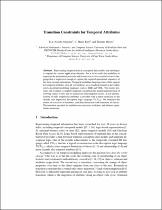JavaScript is disabled for your browser. Some features of this site may not work without it.
- ResearchSpace
- →
- Research Publications/Outputs
- →
- Conference Publications
- →
- View Item
| dc.contributor.author |
Ongoma, EAN

|
|
| dc.contributor.author |
Keet, CM

|
|
| dc.contributor.author |
Meyer, T

|
|
| dc.date.accessioned | 2014-10-24T13:15:30Z | |
| dc.date.available | 2014-10-24T13:15:30Z | |
| dc.date.issued | 2014-07 | |
| dc.identifier.citation | Ongoma, E.A.N. Keet, C.M and Meyer, T. 2014. Transition Constraints for Temporal Attributes.27th International Workshop on Description Logics (DL2014), Vienna, Austria, 17-20 July 2014 | en_US |
| dc.identifier.uri | http://pubs.cs.uct.ac.za/archive/00000950/01/DL14transAttributes.pdf | |
| dc.identifier.uri | http://hdl.handle.net/10204/7725 | |
| dc.description | 27th International Workshop on Description Logics (DL2014), Vienna, Austria, 17-20 July 2014. | en_US |
| dc.description.abstract | Representing temporal data in conceptual data models and ontologies is required by various application domains. For it to be useful for modellers to represent the information precisely and reason over it, it is essential to have a language that is expressive enough to capture the required operational semantics of the time-varying information. Temporal modelling languages have little support for temporal attributes, if at all, yet attributes are a standard element in the widely used conceptual modelling languages such as EER and UML. This hiatus prevents one to utilise a complete temporal conceptual data model and keep track of evolving values of data and its interaction with temporal classes. A rich axiomatisation of fully temporised attributes is possible with a minor extension to the already very expressive description logic language DLRUS. We formalise the notion of transition of attributes, and their interaction with transition of classes. The transition specified for attributes are extension, evolution, and arbitrary quantitative extension. | en_US |
| dc.language.iso | en | en_US |
| dc.relation.ispartofseries | Workflow;13514 | |
| dc.subject | Formal languages | en_US |
| dc.subject | Ontologies | en_US |
| dc.subject | Language technologies | en_US |
| dc.subject | Temporal data | en_US |
| dc.subject | Temporal modelling languages | en_US |
| dc.subject | Preliminaries | en_US |
| dc.title | Transition constraints for temporal attributes | en_US |
| dc.type | Conference Presentation | en_US |
| dc.identifier.apacitation | Ongoma, E., Keet, C., & Meyer, T. (2014). Transition constraints for temporal attributes. http://hdl.handle.net/10204/7725 | en_ZA |
| dc.identifier.chicagocitation | Ongoma, EAN, CM Keet, and T Meyer. "Transition constraints for temporal attributes." (2014): http://hdl.handle.net/10204/7725 | en_ZA |
| dc.identifier.vancouvercitation | Ongoma E, Keet C, Meyer T, Transition constraints for temporal attributes; 2014. http://hdl.handle.net/10204/7725 . | en_ZA |
| dc.identifier.ris | TY - Conference Presentation AU - Ongoma, EAN AU - Keet, CM AU - Meyer, T AB - Representing temporal data in conceptual data models and ontologies is required by various application domains. For it to be useful for modellers to represent the information precisely and reason over it, it is essential to have a language that is expressive enough to capture the required operational semantics of the time-varying information. Temporal modelling languages have little support for temporal attributes, if at all, yet attributes are a standard element in the widely used conceptual modelling languages such as EER and UML. This hiatus prevents one to utilise a complete temporal conceptual data model and keep track of evolving values of data and its interaction with temporal classes. A rich axiomatisation of fully temporised attributes is possible with a minor extension to the already very expressive description logic language DLRUS. We formalise the notion of transition of attributes, and their interaction with transition of classes. The transition specified for attributes are extension, evolution, and arbitrary quantitative extension. DA - 2014-07 DB - ResearchSpace DP - CSIR KW - Formal languages KW - Ontologies KW - Language technologies KW - Temporal data KW - Temporal modelling languages KW - Preliminaries LK - https://researchspace.csir.co.za PY - 2014 T1 - Transition constraints for temporal attributes TI - Transition constraints for temporal attributes UR - http://hdl.handle.net/10204/7725 ER - | en_ZA |






